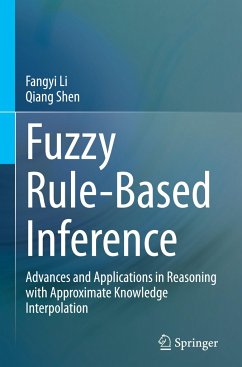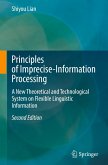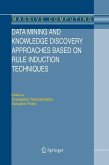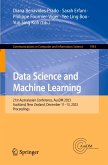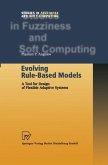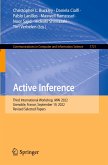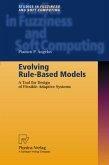This book covers a comprehensive approach to the development and application of a suite of novel algorithms for practical approximate knowledge-based inference. It includes an introduction to the fundamental concepts of fuzzy sets, fuzzy logic, and fuzzy inference. Collectively, this book provides a systematic tutorial and self-contained reference to recent advances in the field of fuzzy rule-based inference.
Approximate reasoning systems facilitate inference by utilizing fuzzy if-then production rules for decision-making under circumstances where knowledge is imprecisely characterized. Compositional rule of inference (CRI) and fuzzy rule interpolation (FRI) are two typical techniques used to implement such systems. The question of when to apply these potentially powerful reasoning techniques via automated computation procedures is often addressed by checking whether certain rules can match given observations. Both techniques have been widely investigated to enhance the performance of approximate reasoning. Increasingly more attention has been paid to the development of systems where rule antecedent attributes are associated with measures of their relative significance or weights. However, they are mostly implemented in isolation within their respective areas, making it difficult to achieve accurate reasoning when both techniques are required simultaneously.
This book first addresses the issue of assigning equal significance to all antecedent attributes in the rules when deriving the consequents. It presents a suite of weighted algorithms for both CRI and FRI fuzzy inference mechanisms. This includes an innovative reverse engineering process that can derive attribute weightings from given rules, increasing the automation level of the resulting systems. An integrated fuzzy reasoning approach is then developed from these two sets of weighted improvements, showcasing more effective and efficient techniques for approximatereasoning. Additionally, the book provides an overarching application to interpretable medical risk analysis, thanks to the semantics-rich fuzzy rules with attribute values represented in linguistic terms. Moreover, it illustrates successful solutions to benchmark problems in the relevant literature, demonstrating the practicality of the systematic approach to weighted approximate reasoning.
Approximate reasoning systems facilitate inference by utilizing fuzzy if-then production rules for decision-making under circumstances where knowledge is imprecisely characterized. Compositional rule of inference (CRI) and fuzzy rule interpolation (FRI) are two typical techniques used to implement such systems. The question of when to apply these potentially powerful reasoning techniques via automated computation procedures is often addressed by checking whether certain rules can match given observations. Both techniques have been widely investigated to enhance the performance of approximate reasoning. Increasingly more attention has been paid to the development of systems where rule antecedent attributes are associated with measures of their relative significance or weights. However, they are mostly implemented in isolation within their respective areas, making it difficult to achieve accurate reasoning when both techniques are required simultaneously.
This book first addresses the issue of assigning equal significance to all antecedent attributes in the rules when deriving the consequents. It presents a suite of weighted algorithms for both CRI and FRI fuzzy inference mechanisms. This includes an innovative reverse engineering process that can derive attribute weightings from given rules, increasing the automation level of the resulting systems. An integrated fuzzy reasoning approach is then developed from these two sets of weighted improvements, showcasing more effective and efficient techniques for approximatereasoning. Additionally, the book provides an overarching application to interpretable medical risk analysis, thanks to the semantics-rich fuzzy rules with attribute values represented in linguistic terms. Moreover, it illustrates successful solutions to benchmark problems in the relevant literature, demonstrating the practicality of the systematic approach to weighted approximate reasoning.

